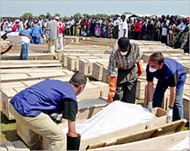Ex-rebels win Burundi election
A former rebel group in Burundi has won the majority of seats in the first parliamentary elections in the war-ravaged Central African nation in 12 years, the country’s top election official says.

Paul Ngarambe, the head of the Independent Electoral Commission, told state-run radio that the Forces for the Defence of Democracy had won between 60% and 80% of the vote in Monday’s election.
Tuesday’s results, combined with municipal elections last month, place the Hutu-led party clearly in power, replacing the previous dominant Hutu party, Front for Democracy in Burundi, which led the transitional government.
“The completed results from 80% of the polling stations nationwide gives the FDD between 60% and 80% of the vote,” Ngarambe said.
“We are still waiting for results from the remaining polling stations, but partial results in those stations are the same, so we expect no major change.”
Ngarambe said there were no significant reports of any problems during the voting and counting. The full preliminary results were expected to be announced later on Tuesday.
“For Burundi, this means change. The population has proved that it was thirsty for change,” said Philippe Nzobariba, executive secretary of a smaller Hutu party, the Rally for Burundian People.
Democracy campaign
Voters cast ballots for the former main rebel group because they wanted to be led by “someone who showed he has physical capacity for change”, he added.
 |
|
How Burundi will deal with war |
Alison de Forges, a Central Africa expert for New York-based Human Rights Watch, said the Forces for the Defence of Democracy staged a highly effective campaign.
“If you look at the preliminary results they have won a huge victory,” de Forges said.
“Their discourse was a politically correct discourse, it was an inclusive discourse of openness. But what remains is how will they implement it, particularly when it comes to justice.”
How Burundi will deal with accusations of war crimes against both the former government and rebel groups has been a huge issue during the peace process.
Carolyn McAskie, head of the United Nations Mission in Burundi, said about 63.8% of the 3.2 million registered voters turned out to cast their ballots in what was seen as another step towards ending the civil war between Hutu rebels and the former Tutsi-dominated army and government.
Voters intimidated
Voter turnout might have been affected by fear of holdout rebel attacks on polling stations. Rebels attacked voters and dozens of polling stations during local government elections last month, killing one person and wounding at least 10 others.
Holdout rebels were accused of stealing balloting material and intimidating voters in some parts of Burundi during the parliamentary elections that are part of efforts to end a devastating civil war.
Civil war began in 1993 after Burundi’s first democratically elected president, a Hutu, was assassinated by Tutsi paratroopers. Some 250,000 people, most of them civilians, have been killed in the war.
A series of peace deals led to the creation of a transitional government in 2001, which most of the rebels have joined. Only one rebel group remains outside the peace process, but it has agreed to a ceasefire.